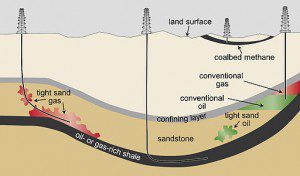 Newspapers tend to offer good coverage of their city’s main industry. So if you want financial news, read the New York Times or the Wall Street Journal. If you want entertainment news, read the Los Angeles Times. If you want political news, read the Washington Post. If you want news about the oil industry, read the Daily Oklahoman.
Newspapers tend to offer good coverage of their city’s main industry. So if you want financial news, read the New York Times or the Wall Street Journal. If you want entertainment news, read the Los Angeles Times. If you want political news, read the Washington Post. If you want news about the oil industry, read the Daily Oklahoman.
It even has an energy editor, Adam Wilmoth, who reported on an eye-opening industry symposium at the University of Oklahoma. We learn about the impact of new oil production technology–such as fracking, horizontal drilling, and oil shale extraction–which has transformed our energy situation from scarcity to unimaginable abundance.
But some will not like to hear this, especially the point about how, in light of the new superabundance, it’s now not bad for energy consumption to go up. And, if these figures are correct, there may not be that much economic impetus for alternative energy sources. Much of the new technology has made oil production more environmentally friendly–there are now only 500 active rigs, pumping far more than the 4,500 rigs in 1981 and the 1,500 rigs in 2014. But those worried that burning carbon contributes to global warming will be frustrated that economic forces will be working against them. And we Oklahomans do not like all of our new earthquakes, which are apparently a by-product of the new oil industry.
Still. . .isn’t energy abundance a good thing and better than the alternative? Or not?
From Adam Wilmoth, Oil companies adjust to new reality | News OK:
The oil and natural gas industry over the past decade has undergone a fundamental shift that has altered industry, commerce and global politics, speakers said Thursday at the University of Oklahoma Energy Symposium.
“The shale revolution has moved the world from scarcity to abundance,” said Kenneth Hersh, CEO of the George W. Bush Presidential Center and co-founder of NGP Energy Capital Management.
“We’re in a world where essentially the supply of natural gas is infinite and the supply of oil is measured in centuries. That is completely different.”
Mike Ming, general manager of the GE Global Research Oil & Gas Technology Center in Oklahoma City, pointed to the country’s drilling rig count to illustrate the industry’s new dynamic.
In 1981, U.S. production declined while 4,500 rigs were drilling for oil and natural gas throughout the country. In 2014, the industry flooded the market with 1,900 rigs. Production dropped early last year when the rig count fell to 400, but it started to increase again with just 500 active rigs. . . .
Another result of the new world of energy abundance is that it’s no longer a bad thing for energy consumption to go up, said Joe Stanislaw, founder of the JA Stanislaw Group.
Illustration of fracking process by unknown US Government employee [Public domain], via Wikimedia Commons















